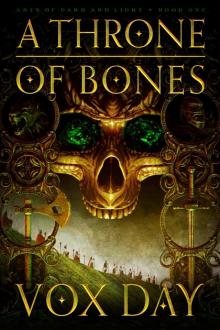A Mind Programmed Read online
Page 3
Thirty decaseconds passed. Women of various ages and shapes descended from the elevators, entered from the front, and descended from the stairs, but none of them was in her late twenties, slender, and red-haired. As the appointed time came and went, he began to fret. What was delaying Flare? She had sought him out yesterday, so why would she fail to show up at the very meeting she had requested? Surely she couldn't have made his men so easily! Was it possible the police car waiting outside might have scared her off?
As he frowned and sucked at his teeth, a cleaning robot began mopping the lobby's marble floor. It made three passes back and forth before stopping in front of him and spinning around to face him. It was faceless, but there was a small visicam lens on its front.
“Greetings. I have a message from Myranda Flare for Mr. Shek,” the little device informed him in a synthetic voice. It only came up to his knee. “Vocal identification is requested.”
Shek grinned and relaxed, even as he felt a moment of chagrin. Clever little minx! Flare was well-trained indeed; she had obviously anticipated the possibility of a trap and adroitly avoided it. Well, even if she gave him the meeting's real location now, he would still bring her in. He might not be armed himself, but his two policemen were and they could track him anywhere she might send him.
“I am Mather Shek,” he confirmed.
Outside the hotel, the two waiting policemen cringed as a thunderous boom erupted despite the clear blue sky overhead. As their var rocked from the force of the blast, it took them a moment to realize the explosion had come from inside the hotel. Thick black smoke and flames belched forth from the gutted lobby, and there was a deafening clattering as the var's armor withstood a brief barrage of stone and metal debris.
“What was that?” the policeman in the passenger seat cried out in alarm as the unexpected bombardment came to an abrupt end.
His companion, older and more cynical, had already put the var in gear and was beginning to lift off from the ground. “That's why you always make sure they pay up front, kid.”
CHAPTER THREE
The ascent of House Malhedron was never as inevitable as later House hagiographers made it appear. Indeed, had Hadrus Haut-Trajan not been so insecure as to reward his most successful admiral's victory at Epsilon Eridani with a court martial, it is entirely credible to imagine that House Trajan would have gone down in galactic history as the ruling House of Man.
—from “A History of Man's First House” by Donatella Lisini
VISIONS. LIGHTS. Voices. Confusion. Darkness. Silence. A scream strangled in her throat.
Daniela York awoke in a panic, short of breath and panting.
She lay on the narrow cabin bunk, catching her breath, feeling the perspiration run and her heart thump as she fought to collect her thoughts. Oh, God, where was she? Then she heard it, a low, whispering rumble that came through the bulkheads, a throbbing, humming vibration that was not quite a vibration. Draco! She was on ATSV Draco, speeding toward Subsector Zero Seven Zero Two, in search of a missing ship. A murdered ship.
She slumped back, feeling the cabin walls close around her, drawing something of comfort from the distant rumble of powerful nucleonic engines that pushed Draco faster, ever faster, pushed it toward that fantastic moment when it would enter hypertransition and the universe would collapse. Or at least it would seem so. At that instant, the stars would disappear, whole galaxies would vanish. Space itself would fold in upon itself and the universe would be blotted out. Darkness. Nothing but the dark. Transit had something to do with twisting the space-time coordinates, but how it worked, she couldn't possibly understand. Few men could. But it didn't matter. At the end of the hypertransit she would find herself deep in uninhabited space.
No, not uninhabited. Somewhere out there was the Shiva-class cruiser Rigel.
Shiva-class!
She let her thoughts flow back to before she boarded the destroyer. She'd been on Kurzweil, the most populous of the cyborg worlds, when Ascendancy Intelligence had caught wind of Prince Li-Hu's latest plan to steal the sunbuster. The source, an Ascendancy loyalist high in the Dai Zhani military, had known only the bare details. The attempt was to occur while the cruiser was in the Kantillon sector. How? When? He hadn't known.
York stirred restlessly. The source had been shot. His controller too. Apparently House Dai Zhan's counterintelligence operatives were as effective as their own.
Pulled off her mission and assigned to the case immediately, she concocted a daring plan to expose House Dai Zhan's treachery while simultaneously protecting the Shiva technology. Now it was in operation. As an operative active on an enemy planet, constantly under the scrutiny of the cyborgs and their god-machines, she'd managed to mask her own movements right up until the moment she'd been extricated. Now the three-dimensional chess game was being played. House Dai Zhan wanted the sunbuster, the cyborgs wanted the sunbuster, and the vast machinery of the Greater Terran Ascendancy was being used to prevent either from getting it.
But contra the religion of the cyborgs, machinery wasn't the answer. In the end it was a deadly contest of the minds and will belonging to three men: August Karsh of the Directorate, Prince Li-Hu of House Dai Zhan, and Golem Gregor of Integration Intelligence. And the game's primary pieces were herself, Dr. G's chief operative Myranda Flare, and X and X and X. The X's were the Dai Zhani, the men who had somehow managed to seize one of the Empire's most powerful warships. But she couldn't write them off as mere X's. Each man was a trained agent, the best House Dai Zhan had to offer. She had scant doubt of that. And they were men. She had no doubt of that at all.
Smiling at the thought of Li-Hu's face if that haughty Kangan princeling ever realized that his two chief adversaries in the field were women, she slipped from the bunk and removed some toilet articles from a small kit she'd brought aboard. Applying a revival cream to her face, she washed in the cabin's small basin, eyeing her reflection in the small mirror. She looked gaunt and strained, with the first hints of wrinkles under her sleep-heavy eyes. To her, the familiar face looked closer to forty than her actual thirty-two years. Despite her best efforts to preserve it, her skin, like the captain's, showed the effects of seeing the light of many strange suns.
Once she'd dressed, she peered into her kit. The small pen that in reality was a pneumatic gas disperser lay in plain sight. Touching a spring button in the lining, she removed a palm-sized plastic mini-blaster from a concealed compartment and slipped it into her pocket. Then she slapped the panel near the door frame and saw her door open silently onto a passageway.
She wasn't surprised to find a guard standing at ease just outside. The man, a deckhand, she guessed, whirled around as she stepped out, one hand smoothly dropping to the weapon at his side.
York smiled at him. “Don't shoot, please. I'm a passenger, not a prisoner.”
The guard grinned and let his hand dangle awkwardly. “Hope I don't have to, miss. It's nice to have a lady aboard for a change.”
“I hope so, too. I really do.” York studied the young man. His face was boyish, but he had the powerful, over-muscled body of a heavy worlder. He could probably throw her clear down the hallway with one arm. His blue eyes, clear and watchful, showed a spark of genuine intelligence. “As long as we're going to be shipmates for a while, we should know each other's name. I'm Daniela York.”
“Les Osborn, miss. Deckhand first.” He didn't ask her any questions, she observed, although her presence on board would have certainly raised a few. That was interesting. It told her Hull's discipline was tight, as she suspected it might be.
“I'm delighted to meet you, Osborn.” York glanced down the passageway. “Would you be so kind as to escort me to the wardroom?”
“It's that way,” he pointed helpfully. “Please lead the way and I'll follow.” York sashayed a little bit more than was strictly necessary as she walked down the corridor. She could feel his eyes focused intently upon her. She grinned to herself. A girl never knew when she might need a favor from a fan.
A single occupant was reading a tablet over breakfast when York entered the wardroom. Around fifty, he had close-cropped gray hair and a strangely thin nose that took up too little space in his broad, square face. Like the captain, he had the seamed, leathery skin of the career spacer.
Glancing up, he caught sight of York and quickly rose, greeting her with a little bow. “Welcome to the wardroom, Miss York. At least, I presume you are Miss York. Unless I mistake my guess, you are our unexpected guest. I'm Vic Benbow, ship's doctor.”
“Daniela York, freeloader by courtesy of Captain Hull,” she replied. She nodded as he graciously indicated a seat for her and sat down in it.
“Have you had breakfast?” Benbow asked.
“Not in several days, I'm afraid.”
“Then I insist that you join me on strictly medical grounds.” He glanced at Osborn. “You can leave Miss York in my hands, Mr. Osborn.”
“I'll wait outside,” Osborn answered, a little stubbornly.
York winked at the deckhand. “I'm touched. We've known each other less than a kilosec and already he is devoted to me.”
“I expect you'll attract more than a few devotees on this voyage, Miss York.” Benbow sat down himself. “You have an effective monopoly, after all.”
“How fortunate for me.” She nodded to Osborn. “It's all right, Mr. Osborn. I promise not to overpower the doctor with a butter knife and use him as a hostage to take over the ship.”
“I'll wait outside,” the young man repeated, unamused.
He left the wardroom. As if in response to an unseen signal from the doctor, a white-jacketed steward appeared.
“Wallu, this is Miss York,” Benbow introduced her. “She'll require a hearty breakfast. But I would advise coffee first. Miss York, do you concur?”
“Absolutely, Doctor.”
“We have Vegan steak today.” The steward suggested. “Perhaps with an egg?”
“Two, please. Sunny.”
As the steward bowed and departed for the galley, Benbow tapped his tablet. “I was reading a fascinating article on the peculiar architecture of Castoris, one of the first planets settled in the Pollux sector. Are you interested in architecture by any chance?”
York recognized the doctor was merely asking the question as a conversation piece to bridge a potentially awkward moment. “Not particularly, but I always enjoy travel and seeing new sights.”
“I have the belief that architecture offers one of the best keys to a culture,” declared Benbow.
“I hadn't thought of it that way.”
“I suspect few people think of it at all.” The doctor slipped comfortably into a discourse on architecture in general, relating it to streams of culture. He spoke easily and well. As York understood it, his theory was that planetary environments influenced the forms that human buildings took, which in turn shaped the cultures of the people who occupied them.
“Architecture therefore can be seen to reflect the subconscious of a people,” he concluded. “In many respects, it is a mirror of the mind.”
“Fascinating, Doctor,” York told him sincerely. “You're not a psychomedic by any chance, are you?”
“Why yes, that is my specialty.” The doctor paused for a moment as Wallu returned with York's breakfast. Once the steward withdrew, he continued. “The human mind is the great mystery of the universe. The deeper we delve into it, the more ignorant we find ourselves to be. But your guess was a logical one, which suggests to me that you possess a keen and observant mind.”
“Merely luck,” she suggested.
“I very much doubt that.” The doctor smiled at her. “But I shall keep the rest of my diagnosis to myself.”
“All good, I hope. It sounds like you enjoy your work.”
“How can I not? It offers new facets every day. No two minds are alike. No two streams of thought run entirely in parallel.”
“And yet I find human motivations to often be depressingly alike. Profit. Power. Fame.”
“Are they? I don't believe so. Not when those motivations are boiled down to the final analysis of their causation. Only the acting man can assign any meaning to his actions. His observers are left in the dark, and can do little more than guess about the causes from the consequences.”
“So you're saying that the analysis of another man's motives is not truly possible.”
Benbow shrugged. “It is possible, within limits, but one must never forget that the analysis is always incomplete and superficial.”
“A professional who perceives the limits of his own profession. I am amazed, Doctor. However, if your analysis is doomed to superficiality, then what are you trying to diagnose when you have a patient with mental or emotional problems, the illness or the cause of the illness?”
“Both,” Benbow responded promptly. “The treatment—I hesitate to use the word cure—depends on the causation as well as whatever physical ailment happens to be present. Naturally, it's the causative factor that I find most intriguing.”
“Naturally,” she teased him. “I imagine you must have your hands full, being the only doctor on a destroyer full of young, virile, tightly wound military men with nary a woman in sight.”
“Not as much as you might think,” Benbow answered with a twinkle in his eyes. “We keep them busy to the point of physical exhaustion. The trick is to get to port every so often and let them blow off steam in a reasonably harmless manner. I suppose one day they'll install an automeds dispenser, and I'll be out in the cold.”
“I'm a little surprised,” York said, honestly this time. “I would have thought that the tensions of space and the long periods of living in such a closed and compact environment would cause considerable stress.”
“To a certain extent,” admitted Benbow, “but rather less than you might expect. The spinward crews are selected with considerable care.”
“Care or conditioning?”
Benbow smiled. “Both,” he admitted.
As they talked, York found herself coming to like the doctor. He had a nimble mind that leaped from subject to subject with ease. And his uncharacteristic lack of curiosity about what she was doing on the ship suggested to her that the captain had warned his officers against asking any questions.
During a pause in one of his mini-soliloquies, this one on the possibility of whether machine sentience was truly possible or not, she asked, “Do you happen to know where we are travelling?”
Benbow brought his eyes up slowly, and York saw the green held flecks of yellow. “I haven't been informed,” he stated blandly. “But I suspect you do.”
“I did notice you rather adroitly avoided any subject that might touch on my reason for being here.”
“Captain's orders. Besides, it's readily apparent that you are an intelligence operative.”
“Am I that obvious?”
“A female civilian coming aboard just before an emergency run? It's either intelligence or nobility, and if I may say so without causing any offense, you don't have either the entourage or the demeanor of a member of a Great House.”
“Or the luggage, I suppose. Which reminds me, Doctor, I need to ask for your assistance in your professional capacity.”
“I am at your service, Miss York. What kind of help do you require?”
“As I suspect you will understand, I was in a bit of a rush prior to boarding.” She met his eyes, then blushed and looked away. “So, you see, I did not have an opportunity to prepare for my monthly cycle.”
Benbow smiled and raised a hand. “Say nothing more, Miss York. I understand, and I am pleased to inform you that Draco is prepared for all eventualities. I will bring the necessary supplies to your cabin after I make my morning rounds.”
“Thank you so much, Doctor.” She raised her coffee cup to him in a mock toast. “I do appreciate it.”
He raised his in return and grinned. “Think nothing of it, Miss York. It is a rare pleasure to have such a lovely and charming passenger aboard.”
CHAPTER
FOUR
A direct comparison of stretches of DNA without function can provide an estimate of the mutation rate per generation between species whose divergence time and generation length are known. Comparisons of pseudogenes and of synonymous sites between humans and chimpanzees have suggested mutation rates on the order of 10−8 per site per generation.
—from “Estimate of the Mutation Rate per Nucleotide in Humans” by Michael Nachman and Susan Crowell
CAPTAIN HULL was staring at a spectroscopic map of Subsector Zero Seven Zero Two when Doctor Benbow led York through the doorway to his cabin. Osborn, who had been following doggedly in the rear, remained outside. Looking at the captain's stocky figure in profile, York realized the man was shorter than she had supposed, and even broader of shoulder.
Hull turned and nodded to her. “Good morning, Miss York,” he greeted her cordially. “Did the accommodations suit you?”
“Very well, Captain. And I had a very pleasant breakfast this morning thanks to the good doctor,” she replied.
“Be careful, Captain, there is a razor-sharp mind hiding behind that pretty face,” Benbow said gallantly. “My thanks for the excellent company, Miss York, and rest assured I shall see to the matter you mentioned earlier. Is there anything else you require?”
“Nothing at the moment.” She smiled at him. “Although if you find yourself unoccupied today, you might figure out how three or four men—half a dozen at the most—could take over a warship.”
“Impossible,” Benbow shook his head. “The crew would have to be unconscious.”
York blinked, surprised that she hadn't considered the possibility. “An interesting thought,” she murmured.
As the doctor left and shut the door behind him, Captain Hull regarded her with suspicion in his blue Achernarni eyes.

 The Wrath of Angels (Eternal Warriors Book 3)
The Wrath of Angels (Eternal Warriors Book 3) SJWs Always Lie
SJWs Always Lie The War in Heaven (Eternal Warriors Book 1)
The War in Heaven (Eternal Warriors Book 1) SJWs Always Double Down: Anticipating the Thought Police (The Laws of Social Justice Book 2)
SJWs Always Double Down: Anticipating the Thought Police (The Laws of Social Justice Book 2) A Sea of Skulls (Arts of Dark and Light Book 2)
A Sea of Skulls (Arts of Dark and Light Book 2) Summa Elvetica: A Casuistry of the Elvish Controversy and Other Stories
Summa Elvetica: A Casuistry of the Elvish Controversy and Other Stories The Altar of Hate
The Altar of Hate A Mind Programmed
A Mind Programmed The World in Shadow (Eternal Warriors Book 2)
The World in Shadow (Eternal Warriors Book 2) The Wardog's Coin
The Wardog's Coin Arts of Dark and Light: Book 01 - A Throne of Bones
Arts of Dark and Light: Book 01 - A Throne of Bones A Magic Broken
A Magic Broken The Last Witchking
The Last Witchking